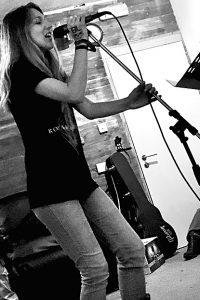Kit Reed: Make a Bunny
 Kit Reed was born in San Diego CA and earned a BA from the College of Notre Dame of Maryland. In the ’50s she worked as a reporter for the St. Petersburg (Florida) Times and in Connecticut, for the New Haven Register, where she was twice named New England Newspaperwoman of the Year in 1958 and ’59. In 1974 she became an adjunct at Wesleyan University, where she ran fiction workshops, and is now Resident Writer there. Reed served on the board of the National Book Critics Circle from 1991-95. She received a Guggenheim Fellowship in 1964, was the first American recipient of an international literary grant from the Abraham Woursell Foundation (1965), and has received numerous other awards and grants. In 1959 she was a Hugo Award finalist for best new author.
Kit Reed was born in San Diego CA and earned a BA from the College of Notre Dame of Maryland. In the ’50s she worked as a reporter for the St. Petersburg (Florida) Times and in Connecticut, for the New Haven Register, where she was twice named New England Newspaperwoman of the Year in 1958 and ’59. In 1974 she became an adjunct at Wesleyan University, where she ran fiction workshops, and is now Resident Writer there. Reed served on the board of the National Book Critics Circle from 1991-95. She received a Guggenheim Fellowship in 1964, was the first American recipient of an international literary grant from the Abraham Woursell Foundation (1965), and has received numerous other awards and grants. In 1959 she was a Hugo Award finalist for best new author.
Reed’s first novel was a comic novel, Mother Isn’t Dead, She’s Only Sleeping (1961), followed by At War as Children (1964), and The Better Part (1967). Her first SF novel was Armed Camps (1969), and other SF works include Magic Time (1980), Fort Privilege (1985), Tiptree Award-shortlisted Little Sisters of the Apocalypse (1994), @expectations (2000), Alex Award winner Thinner than Thou (2004), Bronze (2005), The Baby Merchant (2006), The Night Children (2008), and Enclave (2009). She has also written numerous mainstream novels and psychological thrillers as Kit Craig, and a horror novel, Blood Fever (1986), under the name Shelley Hyde.
Reed’s first SF story was ‘‘The Wait’’ (1958; AKA ‘‘To Be Taken in a Strange Country’’) in F&SF. She has since published scores of stories in genre, literary, and mainstream magazines, as well as anthologies. Notable short works include ‘‘Winter’’ (1969), later included in the Norton Anthology of Contemporary Fiction (1987); World Fantasy Award finalist ‘‘The Singing Marine’’ (1995); ‘‘The Bride of Bigfoot’’ (1998), shortlisted for a Tiptree Award; and International Horror Guild Award finalist ‘‘Family Bed’’ (2004). Her short work has been collected in Mister Da V. and Other Stories (1967), The Killer Mice (1976), Other Stories and… The Attack of the Giant Baby (1981), The Revenge of the Senior Citizens: Plus (1986), Thief of Lives (1992), Tiptree-shortlisted Weird Women, Wired Women (1998), Seven for the Apocalypse (1999), and Dogs of Truth (2005). What Wolves Know is forthcoming. She edited Fat (1974), an anthology featuring stories and essays (genre and mainstream) about food and compulsive eating.
 “I’ve been writing since before I knew how to print – I dictated my first novel to my mother and illustrated Harbor Plots Her Plans, about my plush Easter bunny, Harbor Wilson. In Harbor and Shamrock Wilson, one of the sequels, Harbor’s plane crashes in the jungle and she’s rescued by an African (bunny) princess who turns out to be her long lost sister. I’d written gangs of Harbor books by the time I was 12 and read some 36 Oz books almost as many times. I moved on to My Friend Flicka and wrote horse stories and a never-to-be-finished radio play called The Banditti, which contained the stellar line, ‘‘‘Good heavens,’’ Deanna ejaculated.’ ”
“I’ve been writing since before I knew how to print – I dictated my first novel to my mother and illustrated Harbor Plots Her Plans, about my plush Easter bunny, Harbor Wilson. In Harbor and Shamrock Wilson, one of the sequels, Harbor’s plane crashes in the jungle and she’s rescued by an African (bunny) princess who turns out to be her long lost sister. I’d written gangs of Harbor books by the time I was 12 and read some 36 Oz books almost as many times. I moved on to My Friend Flicka and wrote horse stories and a never-to-be-finished radio play called The Banditti, which contained the stellar line, ‘‘‘Good heavens,’’ Deanna ejaculated.’ ”
…
“Newsrooms used to be terrific places to learn to write. You have to be quick and precise and it beats the temperament right out of you. If you work your heart out and a fat editor shifts his cigar and says out of the corner of his mouth, ‘Good story,’ it’s a very big deal. The even bigger deal was when the managing editor took you into the composing room with the Mergenthalers chattering, where nobody else could hear, and muttered, ‘There’ll be an extra five bucks on your check starting this week.’ God it was wonderful, being told what to write and getting paid for it every Friday.”
…
“Mother Isn’t Dead… is a comedy but it’s pretty dark, with a lot of weird stuff drawn from real life. There really was a guy in St. Pete who built a bridge, and when he got old he went out to sweep the sand off every day. My sense was, whether I was inventing something or not, the work had to be character-driven.
“My career has always run along on two tracks, the so-called ‘literary’ one and SF. I’ve spent my life waiting for the day when everybody realizes it’s not literary schizophrenia, this is all part of the same person.
“Because I write from character, I don’t deal in space aliens or imagined societies. I project from what exists right now, the way things really are, for real people. I’m more concerned with the way things are for my characters than I am with what literary critics used to call ‘paradox and deeper meaning.’
“After Mother came out, my college roommate asked, ‘What is the theme of your novel?’ She was an education major, and pretty earnest. I kind of twirled my hands helplessly, like, ‘I don’t know. It’s just a novel!’ High school teachers try to teach kids to look for themes in what they’re reading, but I don’t work that way. I’m thinking about these people and what’s going to happen to them in this situation.
“Themes are what third parties pull out after the fact. If other people want to do that, fine. I can look back and say, ‘I know why I did this,’ but I never start with, um, literary pretensions and I don’t think you can apply themes like wallpaper or use them for scaffolding. There’s a New Yorker cartoon from way back, this sculptor is standing on a ladder at the top of a huge block of stone, staring blankly and at the bottom, the small child is looking up at him saying, ‘Make a bunny.’
“I’m like the guy on the ladder.”
…
“I don’t know, when I start, how a book is going to come out, so part of the process is discovering the ending. I sometimes think I have an idea, but then I don’t, necessarily. I have to work it through, and sooner or later the ending develops and I see it. I usually start with the cadences of the point-of-view character, whether s/he’s talking in first-person or I’m writing in third-person. I have to hear these people. How the prose is going to go. It begins when I hear it. I have to hear my people coming.
 “The Baby Merchant started when I was sitting in my favorite red leather chair and I heard this voice: ‘I am very good at what I do.’ I took notes on stationery. Then I got on the train and my laptop died, so I just sat there and in my head, Tom Starbird kept on talking. I had maybe ten pages of notes by the time I got home. And the rest of it just followed. Here’s a guy that’s doing something absolutely awful, but by the end of it I was in love with him! (Some blogger said, ‘This writer hates men!’ Boy, did he not get it…) ”
“The Baby Merchant started when I was sitting in my favorite red leather chair and I heard this voice: ‘I am very good at what I do.’ I took notes on stationery. Then I got on the train and my laptop died, so I just sat there and in my head, Tom Starbird kept on talking. I had maybe ten pages of notes by the time I got home. And the rest of it just followed. Here’s a guy that’s doing something absolutely awful, but by the end of it I was in love with him! (Some blogger said, ‘This writer hates men!’ Boy, did he not get it…) ”


 Website:
Website: Excerpts from the interview:
Excerpts from the interview:


Pingback:The Great Geek Manual » Geek Media Round-Up: June 25, 2010
Pingback:Geek Media Round-Up: June 28, 2010 – Grasping for the Wind